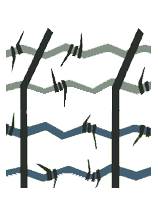|
|
The origin of the idea to create a professional cabaret troupe in Westerbork concentration
camp is uncertain.
Some attribute it to Max Ehrlich, since he was one of the first professional entertainers to arrive there in
1942.
Nonetheless, it is first concretized during the summer of 1943, after Willy Rosen and
Erich Ziegler are also interned.
|
|
|
In 1943 - like so many of his colleagues - Max Ehrlich is
imprisoned in Westerbork concentration camp. Here, he becomes director
of the "Camp Westerbork Theater Group," a cabaret troupe that, during
its eighteen month existence, stages six major theater productions
within the concentration camp`s confines. Almost all the actors are prominent
artists from Berlin and Vienna, such as Willy Rosen, Erich Ziegler,
Camila Spira, and Kurt Geron; or well-known Dutch performers, like
Esther Philipse, Jetty Cantor and Jonny & Jones. At its high point, the
Group counts fifty-one members, including a full team of musicians,
dancers, choreographers, artists, tailors, make-up, lighting and other
technicians, as well as stage hands. Contemporary observers
unconditionally exclaim that the "best cabaret in Europe" now is in camp
Westerbork.
Most of the shows combine elements of revue and cabaret - songs and
sketches - but, on one occasion, the program includes a revue-operetta,
"Ludmilla, or Corpses Everywhere". A production whose theme sadly is a
presentiment of the actors` and other prisoners` ultimate fate. While some scenes
are implicitly critical, of course, the Theater Group - at no time -
produces openly political cabaret or directly attacks the Nazi regime.
To do so would violate the most fundamental condition for the troupe`s
continued existence. Besides, life in Westerbork is dominated by the
persistent threat of deportation on the next transport to an
unknown but deeply feared fate in the East. So, standing, helpless and
unaided before the fascists` executioners and their lackeys, the Theater
Group, of necessity, limits itself to entertaining its audiences and to
momentarily distracting them from the surrounding horrors. But in so
doing, it also gives their captive audiences renewed hope and the
courage to face an otherwise unbearable existence.

|
|
|

